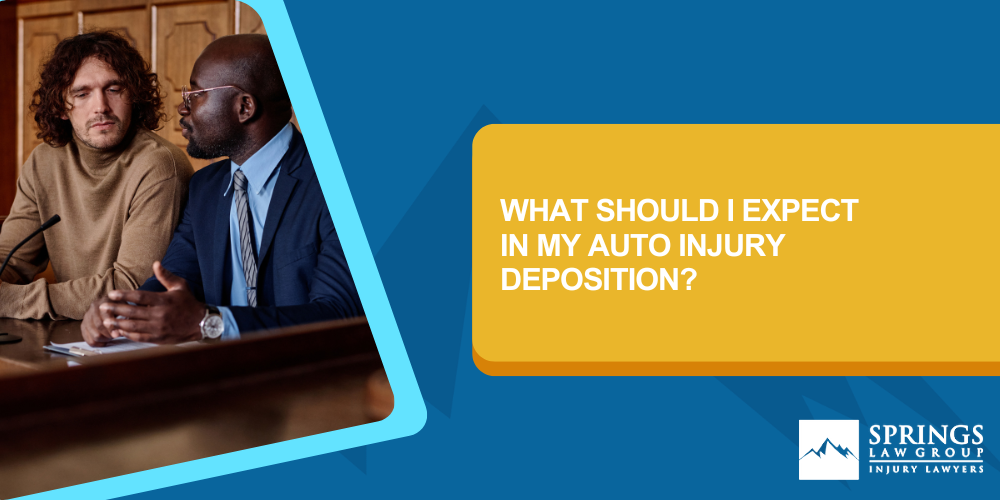What Should I Expect in my Auto Injury Deposition?

If you have been injured in an auto accident and your case goes into litigation, you can be certain the insurance company’s lawyers will take your deposition. We recommend you have an experienced personal injury attorney at your side to help you through the deposition. Your attorney will prepare you for the deposition, but here’s an outline of what you can expect.
It’s Not Like TV!
Surprise! It won’t be like depositions you see on television and film. It’s usually a lot more boring and less antagonistic in an ordinary personal injury case. The attorneys and witnesses typically behave themselves better and treat each other with more respect than on-screen drama. Real depositions would probably get terrible ratings.
Location of the Deposition
Most depositions will take place in the conference room of one of the attorneys. In Colorado, they do not take place in the courthouse, let alone the courtroom. Sometimes, depositions will take place in conference rooms provided by the court-reporting agency.
People Present
At a minimum, the individuals present at the deposition are: the witness (which is you if you’re making a personal injury claim), the witness’s attorney, the insurance company lawyer, and the court reporter. In Colorado, under ordinary circumstances, each party is entitled to attend the deposition, but it is rare and usually unhelpful to the process to have them present. Spouses, significant others, and relatives would need permission from both parties to attend. Media is not permitted.
There is no judge present in the deposition; however, if things get out of hand, the Rules allow the attorneys to try to contact the judge to resolve a dispute, but judges are so busy it’s unlikely they’d be available to rule on a given dispute.
The court reporter’s role is to write down everything that is said at the deposition and to administer the oath to the witness at the beginning of the deposition. Court reporters are neutral and don’t get involved; they just record.
Questions
If you are a personal injury victim, you can expect the insurance company’s lawyer to ask questions about your background, how the accident occurred, your injury history, your personal injuries for the accident in question, your treatment, and the effect the injuries have had on your life.
Attorneys have a lot of leeway in asking you questions that might relate to your claims and your background. Your attorney will be present to make sure the opposing attorney does not go out of bounds, but it’s generally an unpleasant experience for the witness.
Objections
If you’ve seen trials on television or film, you’re familiar with lawyers making objections to questions they think are unfair or out-of-bounds. In the courtroom, the judge can “rule” on the objections—like an umpire, calling balls or strikes. In a deposition, however, there is no judge present, so the attorneys are required to “make a record” of their objections, by stating them for the court reporter to record, but in the vast majority of cases, the deposition continues on. Later, if that part of the deposition is used at trial, the judge will rule on the objection raised earlier. For practical purposes, unless your attorney tells you not to answer a question, the objections don’t make much difference to the witness except to warn you that your attorney thinks there’s something wrong with the question.
Read and Sign
After the deposition is finished, the court reporter prepares a transcript of the deposition. You then have the opportunity to review the transcript for errors the court reporter may have made. You can fill out an “errata sheet” noting your correction of the errors, but you should be prepared to address your changes at trial, especially if they’re significant or dramatic.
Conclusion
Deposition testimony is extremely important and will be used against you at trial if the other side finds it helpful. We recommend you hire an experienced attorney to help you through the deposition process so as to maximize your chances of success at trial, and to defend your rights during the deposition itself.
At Springs Law Group, our experienced personal injury attorneys are ready to help you through all aspects of the personal injury claim process, including depositions. We offer free consultations to discuss with you how we could add value to your case and assist you in achieving the results you deserve. Give us a call today!
